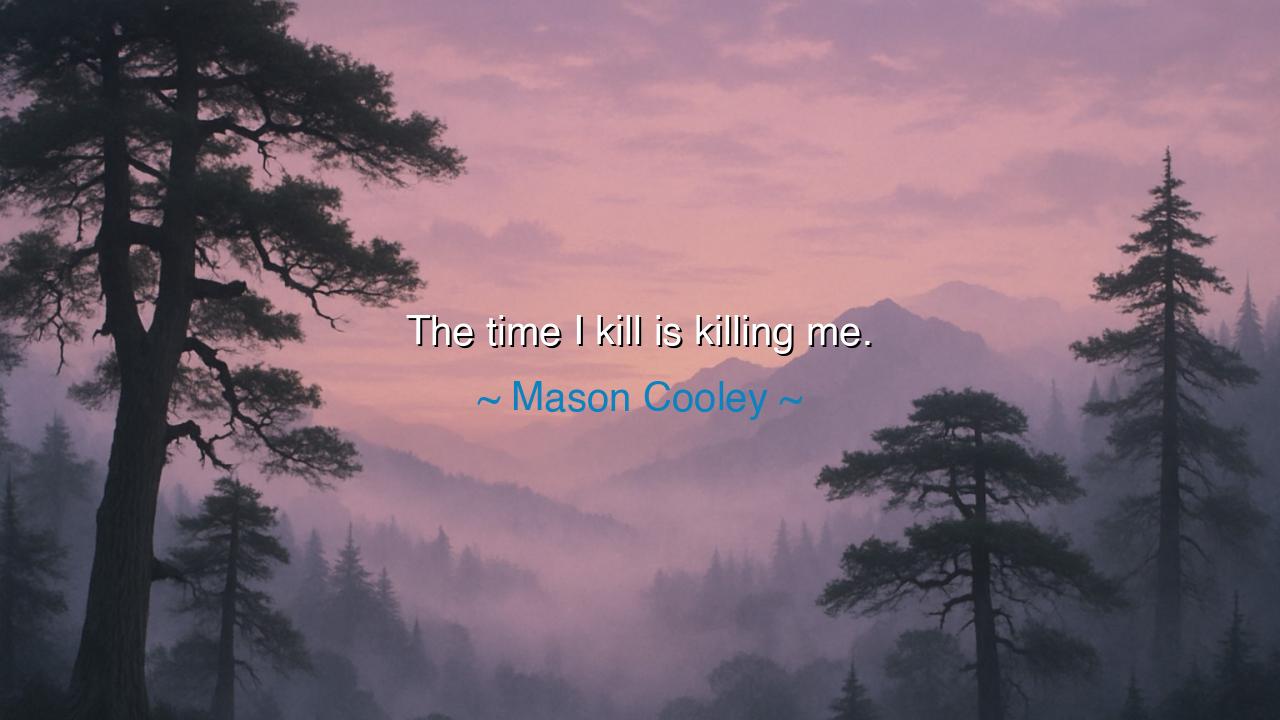
The time I kill is killing me.






The sharp-witted aphorist Mason Cooley once declared with piercing brevity: “The time I kill is killing me.” In these words he unveiled a paradox both tragic and undeniable—that when we waste time, we do not merely cast away minutes, we diminish our very selves. For time is not an endless river from which we may draw without thought; it is the measure of our life, the very breath of our existence. To kill time is, in truth, to wound our own soul, to hasten the decline of the only treasure we truly possess.
The origin of this quote lies in Cooley’s gift for condensing wisdom into striking, memorable lines. He was a master of paradox, often revealing profound truths in the simplest of phrases. His saying here is not merely a critique of idleness, but a reminder of mortality: every moment squandered is a moment surrendered to death. He reminds us that time does not belong to us to be killed—it belongs to itself, and it takes its toll whether we honor it or not.
The ancients, too, spoke of this truth. The Stoic Seneca lamented that “it is not that we have a short time to live, but that we waste much of it.” To waste time is not to injure the hours, but to injure ourselves. Marcus Aurelius also wrote: “Do not act as if you had ten thousand years to throw away. Death stands at your elbow.” Cooley’s modern words echo these ancient voices: in killing time, we are the ones who bleed.
History itself offers examples of this reality. Consider the decline of Rome, when citizens once fierce and disciplined fell into decadence. Leisure turned to idleness, idleness to waste, and waste to decay. The empire that conquered nations could not conquer its own appetite for distraction. Slowly, while its people “killed time,” time killed Rome. Contrast this with the life of Florence Nightingale, who guarded her hours with fierce devotion, using them to transform medicine and bring light to the suffering. In her use of time, she preserved life; in Rome’s squandering, it was destroyed.
The meaning of Cooley’s words, then, is both a warning and a call to courage. The time we kill is killing us not because rest is evil or leisure forbidden, but because thoughtless waste corrodes the soul. Rest refreshes when it serves purpose, but idle distraction—endless hours consumed by nothing—leaves us emptier, weaker, more vulnerable to the passing years. The one who wastes time most grievously discovers too late that time has been wasting him.
Therefore, the lesson is clear: guard your hours as you would guard your life, for in truth they are the same. Do not treat time as an enemy to be slain, but as an ally to be cherished. Every hour can be filled with meaning—whether in labor, in love, in learning, or even in holy rest. What matters is not constant activity, but conscious living. Waste no day in killing time, for each day is a fragment of eternity entrusted to you.
In practice, I counsel this: awaken each morning with intention. Ask yourself, “What will I give this day to ensure it does not slip into nothingness?” Seek balance—work diligently, love deeply, rest wisely, and reflect often. If you find yourself killing time, stop and ask, “What life-giving thing can I do instead?” Even a moment of gratitude, a word of kindness, or a breath of awareness can transform wasted time into sacred time.
Thus, remember Mason Cooley’s sobering truth: “The time I kill is killing me.” Let it be not a sentence of despair, but a summons to vigilance. For though time is fleeting and merciless, it is also abundant when lived with purpose. Waste it, and it devours you. Honor it, and it magnifies you. Choose wisely, for in choosing how to spend your time, you choose how to spend your life.






AAdministratorAdministrator
Welcome, honored guests. Please leave a comment, we will respond soon